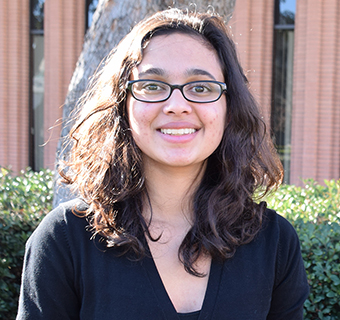
Mahima Verma
USC Shoah Foundation intern Mahima Verma has spent the past year taking a brand-new type of testimony: the stories of second- and third-generation survivors.
Verma, a sophomore history major at USC, first began working on the project in October 2014 at the suggestion of Karen Jungblut, director of research and documentation. The two devised a plan for Verma to take a small number of life history testimonies of the children and grandchildren of genocide survivors. Verma would then present her findings to staff of USC Shoah Foundation.
Jungblut and Verma were especially interested in what experiences these second and third-generation survivors would want to share in such an interview and how their family’s history had affected them throughout their lives.
Verma conducted 15 interviews of children and grandchildren of Holocaust and Armenian Genocide survivors. She depended on word of mouth and referrals to find her subjects, who ranged from UCLA students to the grandchildren of survivors who were in Los Angeles to be interviewed for USC Shoah Foundation’s New Dimensions in Testimony project. Some interviews were conducted via Skype, while others she met in person; Verma made audio recordings of each interview.
Throughout the process, Verma said she continually developed her interviewing methodology and style. She asked her subjects about themselves first – their upbringing, where they lived – before delving into their family history and experiences growing up with a connection to genocide. A big part of her job, she discovered, was simply being patient, non-judgmental, and open to learning from her interviewees.
“You don’t need specific training to be an interviewer, you just need a willingness to sit down and hear,” Verma said.
Verma said she wanted to be sensitive to her interviewees’ experiences and allow them to lead the interview in a direction they were comfortable with. She noticed that descendants of Holocaust and Armenian Genocide survivors often had very different opinions about their history.
“[Armenians] are four generations removed from the genocide but for everyone I’ve talked to it’s very prevalent in their lives. It defines who they are, it’s an injustice, and some of them protest,” she said. “With the Holocaust, there’s a lot of resistance in talking about it; it’s something you want to remember but you want to move on from it.”
Although one second-generation interviewee was uncomfortable sharing details about her family history, most of the young people Verma interviewed were eager to share their perspectives and talk about genocide remembrance. For some, it was the first time they had ever really talked about their connection to genocide.
Verma believes the possibilities for taking testimonies of second and third-generation survivors are endless. Students in all majors could benefit from learning about the family histories and life stories of their peers, and it would teach them about different cultures, tolerance and even provide context for current events.
She knows firsthand the power that testimony has to inspire young people and is passionate about sharing these personal stories with her peers.
“My first time seeing testimony was the first time I fell in love with history,” she said.